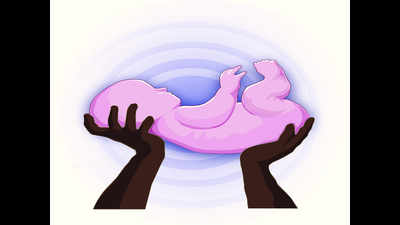- News
- City News
- bengaluru News
- Heat effect: Dehydrated Ballari baby shifted to Bengaluru
Trending
This story is from May 6, 2019
Heat effect: Dehydrated Ballari baby shifted to Bengaluru
Newborns, especially those in the arid regions of Karnataka, are suffering from extreme dehydration due to soaring mercury levels this summer. One baby from Ballari was rushed in an ambulance to Bengaluru for emergency treatment after his birth weight reduced by almost half. While a few babies were reportedly brought from Tumakuru too, details are awaited.

(Image used for representative purpose only)
BENGALURU: Newborns, especially those in the arid regions of Karnataka, are suffering from extreme dehydration due to soaring mercury levels this summer. One baby from Ballari was rushed in an ambulance to Bengaluru for emergency treatment after his birth weight reduced by almost half. While a few babies were reportedly brought from Tumakuru too, details are awaited.
Three weeks ago, a 13-day-old boy was brought from Ballari to Motherhood Hospital, Indiranagar.He was suffering from high fever, his bood sodium levels were high and he was in the neonatal ICU for 12 days. His sodium levels went up to 208mEq/l (milliequivalents/litre) as against the permissible 140-145mEq/l.
High temperature, weight loss, weakness and lethargy are some telltale signs of dehydration among newborns.
At the government-run Vijayanagar Institute of Medical Sciences (VIMS), Ballari, 30 cases of newborns suffering from dehydration were reported this summer.
Abdul Rouf, the baby’s uncle who brought him from Nagasamudra, a village in
As families of such patients can’t afford the treatment in Bengaluru, they’re rarely brought here.
There was a similar case a month ago at the Indira Gandhi Institute of Child Health (IGICH). The baby was referred by a private hospital. Neonatologists say babies’ lives are at risk unless proper care is given immediately.
The newborn was brought with high levels of sodium and acute dehydration. “While temperature could be a reason, the other important factor may have been sodium levels in breast milk. If the mother has consumed more salt during pregnancy and after childbirth, there are chances of her breast milk containing excessive salt and that can cause dehydration in the newborn,” said Dr Naveen Benakappa, head of the neonatalogy department, IGICH.
VIMS saw 60 cases last year
“Last year, we had 60 dehydration cases. This year, we educated mothers that breastfeeding is a simple solution. The mother has to breastfeed frequently and has to keep herself hydrated. Temperature plays a major role,” said Dr Lakshminarayan Reddy, director, VIMS.
Ballari district health officer Dr Shivaraj Hede said awareness programmes are conducted to prevent deaths due to high temperature.
“In Ballari, the temperature has been fluctuating between 39 degrees and 41 degrees celsius. We’ve been telling people to avoid stepping out of their homes to avoid the harsh sunlight. We’ve ensured all government hospitals are stocked with IV fluids,” Dr Hede added. He said children drink too much water at one go can also create problems; the fluid intake should be gradual.
Three weeks ago, a 13-day-old boy was brought from Ballari to Motherhood Hospital, Indiranagar.He was suffering from high fever, his bood sodium levels were high and he was in the neonatal ICU for 12 days. His sodium levels went up to 208mEq/l (milliequivalents/litre) as against the permissible 140-145mEq/l.
High temperature, weight loss, weakness and lethargy are some telltale signs of dehydration among newborns.
At the government-run Vijayanagar Institute of Medical Sciences (VIMS), Ballari, 30 cases of newborns suffering from dehydration were reported this summer.
“The baby’s creatinine levels were also very high: 8mg/dl against the normal range of 0.4-0.5mg/dl. He was suffering from renal issues and was on dialysis. Though he weighed 3kg at birth, he had suffered acute weight loss by the time he was brought here. He couldn’t be breastfed and was hardly getting any required nutrients,” said Dr Pratap Chandra, head of the neonatology department, Motherhood Hospital.
Abdul Rouf, the baby’s uncle who brought him from Nagasamudra, a village in
Chitradurga district, said the baby had turned pale and the fever didn’t subside. “The government hospitals at the hobli level asked us to go to Bengaluru. We travelled in an ambulance with the ailing child for almost an entire day. He’s doing better after almost two weeks of treatment,” he said. The family had first gone to hospitals in Ballari, 40km from their village.
As families of such patients can’t afford the treatment in Bengaluru, they’re rarely brought here.
There was a similar case a month ago at the Indira Gandhi Institute of Child Health (IGICH). The baby was referred by a private hospital. Neonatologists say babies’ lives are at risk unless proper care is given immediately.
The newborn was brought with high levels of sodium and acute dehydration. “While temperature could be a reason, the other important factor may have been sodium levels in breast milk. If the mother has consumed more salt during pregnancy and after childbirth, there are chances of her breast milk containing excessive salt and that can cause dehydration in the newborn,” said Dr Naveen Benakappa, head of the neonatalogy department, IGICH.
VIMS saw 60 cases last year
“Last year, we had 60 dehydration cases. This year, we educated mothers that breastfeeding is a simple solution. The mother has to breastfeed frequently and has to keep herself hydrated. Temperature plays a major role,” said Dr Lakshminarayan Reddy, director, VIMS.
Ballari district health officer Dr Shivaraj Hede said awareness programmes are conducted to prevent deaths due to high temperature.
“In Ballari, the temperature has been fluctuating between 39 degrees and 41 degrees celsius. We’ve been telling people to avoid stepping out of their homes to avoid the harsh sunlight. We’ve ensured all government hospitals are stocked with IV fluids,” Dr Hede added. He said children drink too much water at one go can also create problems; the fluid intake should be gradual.
End of Article
FOLLOW US ON SOCIAL MEDIA










